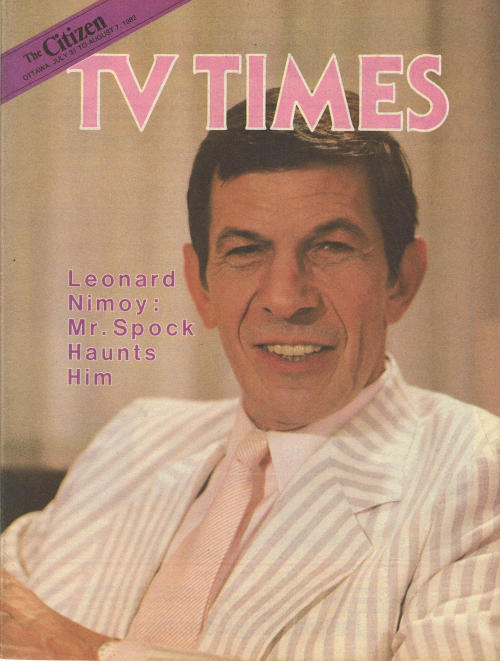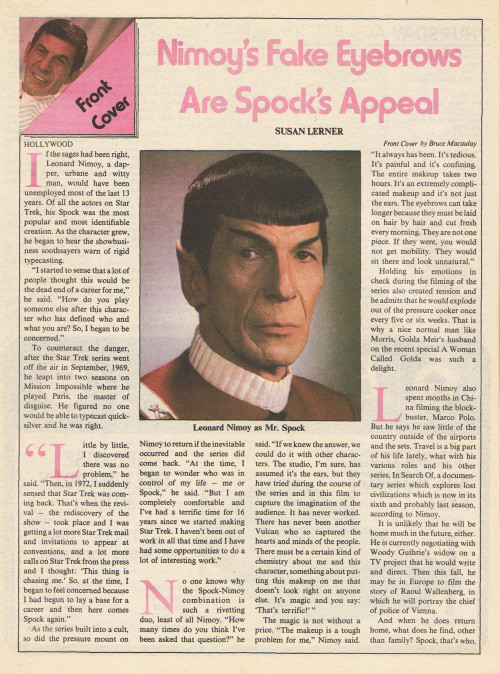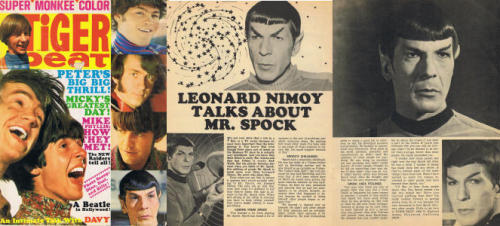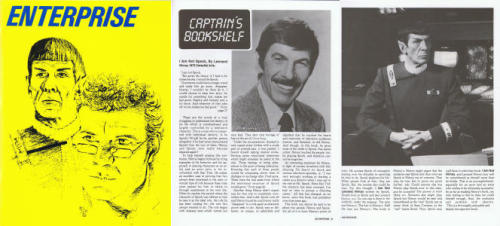Spock and the Magic of the Black Swan
 The studio, I'm sure, has assumed it's the ears, but they have tried during the course of the series and in this film [The Wrath of Khan] to capture the imagination of the audience. It has never worked. There has never been another Vulcan who captured the hearts and minds of the people. There must be a certain kind of chemistry about me and this character, something about putting this makeup on me that doesn't look right on anyone else. - Leonard Nimoy (1)
The studio, I'm sure, has assumed it's the ears, but they have tried during the course of the series and in this film [The Wrath of Khan] to capture the imagination of the audience. It has never worked. There has never been another Vulcan who captured the hearts and minds of the people. There must be a certain kind of chemistry about me and this character, something about putting this makeup on me that doesn't look right on anyone else. - Leonard Nimoy (1) Is it true? Is he really the only one that could work the magic of being Vulcan? The interview is from 1982 and since then we've seen a few more pointed eared fellows. My first reaction reading that was to wonder if it still was true.
There is the late Mark Lenard as Spock's father, Sarek, who clicked with the audience. One might have been angry with him because one was on Spock's side as a viewer but Sarek's charm, integrity, and humor won us over in Journey to Babel. He was a character that one would like to see more of. (If only to gain one more shred of information about Spock.) Mark Lenard could carry the mystique that surrounds Vulcans. With him, as with Spock, there was audience knowledge that there was more going on within the characters than one saw on the screen and glimpses of it were kept to treasured moments. Those characters had an inner life that made them interesting, complete, and endearing to the audience. Scrap endearing and even T'Pring and T'Pau would fit the bill.
Sybok's storyline (digging up previously unheard of close relatives often is a device employed by long running soap operas) upset me at first. But he's really grown on me in fan fiction where his existence has enriched the lore.
Moving on to the two other main Vulcan characters. I didn't connect to Tuvok the same I did with the TOS characters. There's nothing wrong with the actor, the ears, or the character, but then Voyager itself is a bit of an acquired taste for me. Modeled after TOS he was supposed to be close to the captain. That didn't really materialize along with some other promises the show didn't keep - at least at first. Trying to define what quality Tim Russ brought to Tuvok I'd say he made him a good sport. If I'm going to rewatch any of the post-TOS series, it would be Voyager and I think I would be looking forward to rediscovering their resident Vulcan.
And then there's Enterprise. Don't get me started about what's wrong with that series. Casting, for once. Doesn't T'Pol scream "fake" from head to toe starting with the wig? A Vulcan quality that the production team on the new Star Trek movie and Zachary Quinto seem to have realized appears to be authenticity. When Entertainment Weekly ran a cover with the new Kirk and Spock on it one of the main points of contention was that the hair on Zachary Quinto looked like a wig. (2) There was a bit of an outcry but Quinto could placate any and all concerns with the assurance that it really was his hair in the film and that the experience actually helped him with the character. (3)
Restraint is another feature that lends itself to their appeal. The problem with T'Pol is that her character was geared from the beginning for excess. Starting with the choice of a former model/actress that filled the costume rather than the space between the ears and the invention of the decontamination chamber for the sole purpose to provide an opportunity for nakedness and groping. (4) She's Vulcan's answer to sex, drugs, and Rock 'n' Roll - or Jazz, as is the case with her. (5) With restraint comes subtlety, a powerful tool that Leonard Nimoy discovered while watching Harry Belafonte perform on stage and that provided him with the key to Spock's mannerisms. (6) At a time where much can be shown and done on TV, subtlety has become a rare commodity. Would Spock have become the object of fantasy and articles about the Vulcan's sexual appeal if it hadn't been for the powerful lure of the hunt of the elusive object? (7) T'Pol, readily available, not only becomes the subject of physical excess but also of emotional melodrama in relation to Trip and Captain Archer which makes her a controversial character. (8) Though, she and Spock actually do have something in common. They both, for different reasons, don't fit into Vulcan society and found Earth/Star Fleet as a means to carve out a niche for themselves. There even is authenticity, tying Jolene Blalock's experience of alienation to her character's background. (9) But while a whole section of society, the adolescents, could find themselves represented in Spock at the time, the same cannot be said for T'Pol. (10) The struggle that could have made her character relevant was exploited for cheap and easy satisfaction in the fan fictionesque treatment of the Trip/T'Pol story arc with Archer thrown in for good measure. (11) In terms of being a good Vulcan, she's a complete failure. But maybe that's the (more thorny) path to appreciation of her character. Starting with Sybok, we have been made aware that Vulcan has its flotsam and maladjusted, too.
The one actor with the potential to portray a Vulcan character that can reach the general audience again and not just the Star Trek watching segment of the population actually plays Spock, namely Zachary Quinto. But he is convinced that the same merger that fused Spock and Leonard Nimoy together in public imagination will not be happening to him, citing the different status of science fiction since the 1960's, people's shorter attention span, and most importantly, that he didn't create Spock.(12) A feeling echoed in a review from the past of I'm Not Spock where the author says that "Nimoy would be seen and remembered as the 'real' Spock just as many think of Sean Connery as the 'real' James Bond." (13)
Star Trek has often been talked about as a phenomenon. In the vein of Nassim Nicholas Taleb it could also be called a "black swan," a singular, random event that could not have been predicted at its time with profound ramifications. (14) It becomes part of the collective consciousness and is passed on to coming generations as a (cautionary) tale through narrative. There were signs pointing to the event looming on the horizon, but because of people at the time having blind spots, is not recognized and can only be explained after the fact. (15) While looking at his graying beard and thinking how it made him look ten years older, Taleb reflected on the reverence that society bestows on the elderly and realized that this might function to compensate our short term memory. The elderly are repositories for inductive learning (induce a general rule from a set of observed instances), he says, and possess knowledge of rare events. They're sought out for advice. (16) At one time or another all cast members have been asked to explain the phenomenon Star Trek had turned into, the inference being that they had to be experts on the subject by having been part of it. Aside from Taleb having a special room reserved in hell for experts, the blind spot those involved suffer is undeniably in evidence. This remark made by Mr. Nimoy in 1969 about the future of Star Trek falls in the category of famous last words:
"Someone was quoted as to the possibility of us all making a Star Trek movie, but I think such talk is bad. All it does is to rekindle emotional campaigns to get the show back on the air. Every time I hear or read about such things, I try to discourage the people involved," he pointed out. (17)
Good thing forty years later he heard Alex Kurtzman and Roberto Orci out when they came proposing a Star Trek movie. Having the movie revolve around William Shatner would screw up continuity was the reason given for his absence, since Kirk would be physically older than when we last saw him die in Generations. Spock on the other hand would have outlived them all, with a life span at least twice that of a human, which would also take care of the need for further cameos by the original actors. But maybe Spock was a good choice for another reason, if the filmmakers wanted to add credibility to their efforts. That reason would have to do with the very different public image represented by the two actors. The respected artist, intellectual, teacher (plus the many other qualities attributed to him in the public eye) against the self-styled clown with a propensity for self-parody (which worked to great advantage in Boston Legal). In addition, within Star Trek, Spock himself was a "black swan", unexpectedly soaring past the ship's captain in popularity within a short time. If you would like to remind your audience of an extraordinary success story, going with the more recognizable and respected icon is not a bad idea in itself. (18/19)
With Zachary Quinto and the others signed on for only three movies so far, compared to the many hours of television and film the original crew did, it looks like Leonard Nimoy still has it right. But far more is involved than just putting the makeup on the right kind of face. It's the individual he helped create and bring together at the right time at the right place that made them both, "iconic". To cite again from the review of I'm not Spock, "Thus, Spock may well have to write that book: I Am Not Nimoy, and Leonard Nimoy may well be remembered as himself more than he thinks."
1.
|
  |
|
2.
|
32. Norman - October 15, 2008 #30 – it looks as if Spock is wearing a wig. whereas Nimoy got his haircut Vulcan Style… 97. bdrcarter - October 15, 2008 Didn’t they use Zack’s real hair? It looks like he’s in one of the TNG-era vulcan wigs. Bummer. http://trekmovie.com/2008/10/15/star-trek-cover-story-in-entertainment-weekly/ |
|
3.
|
And what about the sideburns? Because they look really cool. The sideburns … All of it was mine, all of it was mine. My hair, my eyebrows: Everything that we did in this movie was really mine. I mean, you know, I shaved my eyebrows, I cut my hair into the bowl haircut, and the sideburns were pointy. It was all me. http://nymag.com/daily/entertainment/2009/04/star_treks_zachary_quinto_on_h.html |
|
| How was it wearing the ears? Once they were on they were no problem at all. I honestly didn’t even know that they were there. It was getting them on in the morning that could be tedious just because it required me to show up to work two hours before anybody else. But the one thing I didn’t really anticipate through this process was how impactful the physical alterations would be on my personal life. Having no eyebrows and having to shave everyday and having my hair in this sort of horrible bowl style really alienated me from myself and alienated me from other people. I tended to isolate a lot more during the process of this film and I think it actually served my relationship to the character because that kind of alienation is something that he struggles with greatly in his life - particularly in this film. http://www.femalefirst.co.uk/movies/Zachary+Quinto-7172-page2.html |
||
4.
|
Decontamination chamber sequence see YouTube and http://www.myvideo.de/watch/1306815/Jolene_Blalock_The_sexiest_Star_Trek_Girl_ever | |
| 5. | Pa'nar, trellium, mind melds, and emotion see http://en.wikipedia.org/wiki/T'Pol | |
| 6. | Nimoy, Leonard, I'm Spock, Century, London, 1995, p. 45-46. | |
7.
|
 |
|
8.
|
T’pol is the worst Vulcan in existence. Oo, look at me, I have an eating disorder! Ooo, look at my lovely collagen-filled lips! Ooo, I’m addicted to Trellium-D! Ooo, I was mind-raped! Ooo, I like to explore my emotions! Oo, let’s decontaminate each other in slow motion, Trip! Oo, Trip let’s have sexy Vulcanneuropressure times! Ooo, Archer I don’t want you to die, I love you! Oo, but I love Trip! Oo, Trip I am so jealous of that corporal bitch! Oo, I’m a fucking failure. Seriously, even Spock is more Vulcan than her and he is half human! http://rudeandnotginger.tumblr.com/tagged/T'pol |
|
9.
|
She said of her childhood: "I was such an awkward-looking child, I've no idea what happened. I didn't have a good childhood because I never could get along with other kids. I was the child that sat in the corner eating lunch by herself. I worked in the library at lunchtime because I had no real friends. I read a lot and educated myself a different way because me and school didn't get along. Even boys were never interested in me. I remember playing kiss-chase in the first and second grade. I would run but no one would ever chase me." http://en.wikipedia.org/wiki/Jolene_Blalock |
|
10.
|
 |
|
11.
|
Since fan fiction has become the subject of respectable academic study and knowledge of it wormed it's way into the consciousness on the production end of media content, I believe there is a trend in television to cater to those needs written out in fan generated stories. Enterprise did it very conventionally with Trip/T'Pol and I've been watching a series called Lost Girl that can only be called fan fiction's wet dream put on the screen, while The Big Bang Theory delightfully works the Slash angle. | |
12.
|
"When you do Spock, you're just Spock for the rest of your life, right? It’s a part of you for the rest of your life. I don’t think I’m going to be inextricably tied to him for the rest of my life, but that’s because science fiction doesn’t have the same stigmas attached to it now as it did 40 years ago, because people’s attention spans aren’t as stalwart as they were 40 years ago, and it’s also because I know I didn’t create the role. No matter how strongly people respond to my performance, it doesn’t matter, because it wasn’t my brainchild, you know." http://nymag.com/daily/entertainment/2009/04/star_treks_zachary_quinto_on_h.html |
|
Remembering that Star Trek has often been cited as the first Science Fiction show aiming at an adult audience that it took serious, it is no wonder people flocked to it and enshrined it in light of what was available elsewhere. This video I uploaded made "Video of the Day" at Trek Movie. I recommend reading some of the comments there. |
||
13.
|
 |
|
14.
|
The Black Swan Theory or Theory of Black Swan Events is a metaphor that encapsulates the concept that The event is a surprise (to the observer) and has a major impact. After the fact, the event is rationalized by hindsight. http://en.wikipedia.org/wiki/Black_Swan_Theory | |
15.
|
"Marketing personnel of the network complained to management that the series' cancellation was premature. New techniques for profiling demographics of the viewing audience later showed that Star Trek had been highly profitable for advertisers, though this news came too late to resume production of the series." http://en.wikipedia.org/wiki/Star_Trek | |
16.
|
Nassim Nicholas Taleb, Der Schwarze Schwan, Deutscher Taschenbuchverlag: München, 2010, S.106. | |
17.
|
 |
|
18.
|
 http://yayeveryday.com/post/3142 http://yayeveryday.com/post/3142 http://www.esquire.co.uk/2009/04/the-covers-that-didnt-make-it/ |
|
19.
|
"Nimoy’s presence gives the franchise revival 'a very important sort of approval – there’s a torch being handed off there,' according to Pine, and director J.J. Abrams describes the elder actor’s participation in the film as 'essential to our goal to serve and celebrate the history of ‘Star Trek’ with this story and create something new and exciting. (...)
'This is the first and only time I ever had a filmmaker say, ‘We cannot make this film without you and we won’t make it without you,’” Nimoy said with another one of those startling smiles. “J.J. Abrams said that – that’s a pretty heavy statement. And when you see the film you see how central the character is to the story they’ve told.' Nimoy stands as 'the figure of credibility' for the franchise, as Orci put it, which sounds like an unintended ding on William Shatner, the original Kirk and an actor who publicly lobbied for a role in this new $140-million film." http://herocomplex.latimes.com/2009/05/11/leonard-nimoy-star-trek-fans-can-be-scary/ |
|

